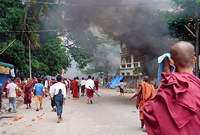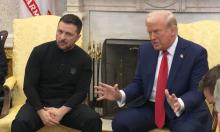U.N. official makes desperate effort to meet Myanmar's military leaders
A top official of the United Nations Organization made a desperate effort to meet Myanmar's high-ranking military leaders Monday to persuade them to ease a violent crackdown on anti-government protesters. THe U.N. official previously met with detained opposition leader Aung San Suu Kyi.

Authorities, meanwhile, said foreigners were partly to blame for the crisis that has engulfed the country.
Thousands of troops were deployed in Yangon during U.N. special envoy Ibrahim Gambari's visit, keeping all but the most die-hard demonstrators off the streets. Truckloads of soldiers rushed to the city's outskirts following rumors of a march, and a helicopter hovered overhead. All cars and buses coming into town were searched.
Hundreds of people have been arrested, further weakening the flagging uprising against 45 years of military dictatorship. The protests began Aug. 19 when the government sharply raised fuel prices, then mushroomed into the junta's largest challenge in decades when Myanmar's revered monks took a leading role.
Soldiers have shot and killed at least 10 people - though diplomats and dissidents say the number is likely higher - ransacked Buddhist monasteries, beaten monks and arrested an estimated 1,000 people in the last week.
Gambari arrived Saturday to try to persuade the notoriously unyielding military junta to halt its harsh crackdown. He spent the weekend in talks and transit, pressing ahead with shuttle diplomacy even after his first meeting with the junta did not include its leader, Senior Gen. Than Shwe, or his deputy, Gen. Maung Aye.
He returned to Myanmar's isolated capital of Naypyitaw for a second time in hopes of meeting them Monday.
Gambari "looks forward to meeting ... Than Shwe," before he leaves the region, the U.N. said in a statement. The junta, which has rebuffed scores of previous U.N. attempts at promoting democracy, did not comment.
Gambari's hour-long talk with Suu Kyi on Sunday was somewhat unexpected - he did not know before he arrived if he would be allowed to meet the 1991 Nobel Peace prize winner who has come to symbolize the struggle for democracy in Myanmar. She has spent nearly 12 of the last 18 years under house arrest.
Suu Kyi' National League for Democracy party was not optimistic Gambari would yield any influence over the junta leaders, telling Radio Free Asia they see him as a "facilitator" who can bring messages back and forth, but lacking authority to reach a lasting agreement.
The junta has never responded well to international pressure in the past. But its desire for oil and gas investment, increased tourism and its status as a member of the Association of Southeast Asian Nations means it cannot follow a completely isolated path, as it has in the past.
"I do think a number of underlying dynamics have changed quite fundamentally and make us more hopeful that something might happen," said British Ambassador to Myanmar, Mark Canning.
"I do believe now it's got the attention of all the international community in a way it didn't before."
On Monday, the official press said outsiders were partly to blame for the current crisis.
"Internal and external destructionists are applying various means to destroy those constructive endeavors by the government and the people and to cause unrest and instability," the New Light of Myanmar said.
It said 11 people were arrested over the weekend in two separate demonstrations, several of them university students. Some were carrying identification cards for studying English at the U.S. Embassy's American Center in Yangon, the paper said, adding that "weapons" seized included five slingshots and marbles, a pair of scissors and one sharp iron rod.
The crackdown in Myanmar has riveted the globe, with foreign governments from Asia, to North America to Europe calling on the junta to find a peaceful end to the crisis.
ASEAN, the 10-member bloc that includes Myanmar, wrote a letter to Than Shwe on Monday expressing "revulsion" at the violent repression of demonstrators.
"The confrontation that is unfolding in Myanmar will have serious implications not just for Myanmar itself, but also for ASEAN and the whole region," wrote Singapore Prime Minister Lee Hsien Loong, whose country currently chairs the regional grouping.
He urged the military rulers to work toward national reconciliation and to help Gambari "try to find a way forward."
Many see China, the junta's biggest trading partner, as the most likely outside catalyst for change. But China, India and Russia, dazzled by Myanmar's bountiful oil and gas resources, do not seem prepared to go beyond words in dealing with the junta.
Japan, the junta's largest aid donor, said it was mulling sanctions or other actions to protest the crackdown, which left a Japanese video cameraman dead, chief Cabinet spokesman Nobutaka Machimura said Monday.
The military rulers have sought to limit news coming out of Myanmar, with public Internet access restricted and mobile phone service sporadic.
Soldiers have gone to hotels in search of foreign journalists operating without proper licenses. At least four local journalists have been arrested and others have been detained or harassed, Reporters Without Borders and Burma Media Association wrote in a statement.
Subscribe to Pravda.Ru Telegram channel, Facebook, RSS!





